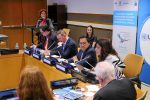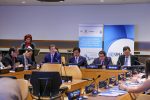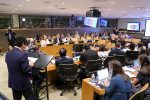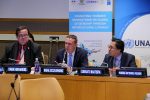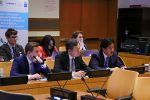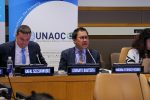REMARKS FROM H.E. NASSIR ABDULAZIZ AL-NASSER
UNITED NATIONS HIGH REPRESENTATIVE FOR THE ALLIANCE OF CIVILIZATIONS
“Educating Younger Generations on Global Citizenship through Intercultural Literacy”
2 May 2018 3PM, UNHQ Conference Room 6
Co-organized by the Mission of Kazakhstan and UNAOC
Excellency Mr. Kairat Umarov, Permanent Representative of Kazakhstan,
Dr. Galyn Mutanov, Rector of Al-Farabi Kazakh National University.
Dr. Andrey Khasbulatov, Director General of Kazakh Scientific institute for Curtural Research,
Distinguished Scholars and Guests,
Distinguished Panelists,
Distinguished Academic Members,
Ladies and Gentlemen,
The UNAOC is again very pleased to be co- organizing this event with the mission of Kazakhstan.
I wish to start by recognizing our Rector, Mr. Galyn Mutanov, whom I thank for his warm welcome during my visit to Al-Farabi Kazakh University, in May 2017 in Almaty, Kazakhstan. I take the opportunity of his visit in NY, UN Headquarters to meet on a serious civic educational and moral issue: “Educating younger generations on global citizenship through intercultural literacy”.
It is also an occasion to learn more about the vision of the great thinker of the Orient, “Abu Nasr Mohammed Al-Farabi”.
Al-Farabi is known as a bridge builder between classical Occidental civilization and the Islamic civilization. His influence and teachings in the Arab world have closed many gaps and eliminated many misunderstandings between the two civilizations. After his death, and through the Middle Ages, Al-Farabi’s teachings influenced the minds of Arab leaders throughout the Muslim world both on the meaning of Life and on the future of Mankind. His teachings and influence have therefore contributed to a genuine philosophical rapprochement and mutual understanding between civilizations, which lasted until Modern times.
What we have to retain is that over the centuries his work has symbolized the most valued humanistic qualities of love, tolerance, understanding and respect of the other no matter what belief or color.
“Knowledge without upbringing, without a moral beginning, can bring harm, not good.” This quote from the great philosopher Al-Farabi is the essence on which Global Citizenship Education Programs all over the world can lean on.
UNAOC is especially committed to achieving the goals of global education, particularly since education and youth are two of the four pillars of our programing. For UNAOC, education is a vital component of developing tomorrow’s leaders.
To understand the vital importance of education, article 26 of the Universal Declaration of Human Rights specifically provides that “Everyone has the right to education,” and that “education shall be directed to the full development of the human personality and to the strengthening of respect for human rights and fundamental freedoms, while promoting understanding, tolerance and friendship among all nations, racial or religious groups.” The link between education, tolerance and friendship among nations relates to the specific mandates of UNAOC.
On a global scale, however illiteracy remains a serious problem. Some 793 million adults – two-thirds of them women – lack basic literacy skills. Such illiteracy makes poverty worse and deepens deprivation. Education is a powerful tool by which such economically and socially marginalized adults and children can lift themselves out of poverty and participate fully as citizens.
Intercultural literacy, which is more than just reading and writing, but understanding the dynamics of our own and other cultures, must fit within the overall educational effort and can have a multiplier effect.
Media literacy is another dimension which is not widely recognized. Its importance as an aspect of civic and peace education and therefore few instructional programs have been developed as part of basic modern education.” UNAOC’s Media and Information Literacy program organized an event in 2017 titled, “Media and Information Literacy: Educational Strategies for the Prevention of Violent Extremism.” The report of that meetings recommends that “Media literacy programs should be implemented in schools, particularly at the secondary level, to help develop a critical approach to news coverage by media consumers and to promote media awareness and development of Internet literacy to combat misperceptions, prejudices and hate speech.”
I should let you know that on the occasion of 2018 World Press Freedom Day, UNAOC is collaborating with the News Literacy Project (NLP) on two panels at the UNHQ tomorrow, May 3 2018. This year, UNAOC is organizing two open conversations underscoring the role of news literacy education in promoting civil discourse and freedom of speech.
Youth is one of the 4 pillars of the Alliance. When we say Youth, we are talking about the Future of the world. We see them as Agents of change. Unfortunately, Youth are also the target of extremist groups. Many of them join these groups because they are marginalized within their own communities.
The Alliance has partnered with various organizations and initiatives to increase education for youth worldwide, including young girls who are not currently enrolled in school. This is possible thanks to its several flagship projects (Youth Peacebuilders, Fellowship Programme, Youth Solidarity Fund, Plural + Youth Video Festival, Media Information Literacy for teachers, Peace App, IIA, Hate Speech in the Media. The Alliance maintains this global network of partners to enhance UNAOC’s work related to global citizenship education and address the root causes of extreme violence.
Though we have many of our own educational programs, we recognize the importance of global efforts and international cooperation. The UN and various partners have launched several global initiatives on Education. Among them, “Education First” with Gordon Brown as a special envoy for Global Education to strengthen quality education and “Education Above All” (EAA) led by Her Highness Sheikha Moza. Out of the 73 million out of school children, EAA with “Educate a Child” has reached out to 10 million children .This achievement was celebrated last Friday at the NY Library in presence of the Secretary General. However 63 Million remain. There is no time to waste we have to act.
Ladies and gentlemen, Dear Friends,
Global Education is important in providing the skills, knowledge, attitudes and values to individuals to understand interdependence, inequalities, and exclusion in the dynamic world, and commits to transform the world to achieve greater justice, equity, and human rights for all.
Nations with increasingly multi-religious and multi-ethnic populations must recognize the need for more inclusive education about the world and its people. Kazakhstan, with its very diverse ethnic and cultural background is one of the leaders in this field.
UNAOC has taken several initiatives to include and mobilize religious leaders around the world as promoters of peace and cultural understanding. UNAOC has an important role to play in advancing new perspectives for humanitarian action, particularly thanks to its cooperation with continuously growing networks of religious leaders. They are the voices of moderation, and like civil society organizations, they have the knowledge, experience and power to reach communities threatened or plagued by humanitarian or conflict situations.
Global Citizenship and its relation with the Culture of Peace at the United Nations is an important goal. Global Citizenship Education aims to empower learners of all ages to assume active roles, both locally and globally, in building more peaceful, tolerant, inclusive and secure societies. The culture of peace and the ethics of nonviolence is a combination of ethical norms and behaviours that Universities can teach to younger generations.
Ladies and gentlemen, Dear Friends, Let me conclude by making a wish. My wish is that genuine progress will be made in Education and Global Citizenship. “Ensuring younger generations on global citizenship through intercultural literacy” is my responsibility, your responsibility, and our responsibility.
Thank you.
To learn more about this event, click here. To view pictures from this event, click here.

